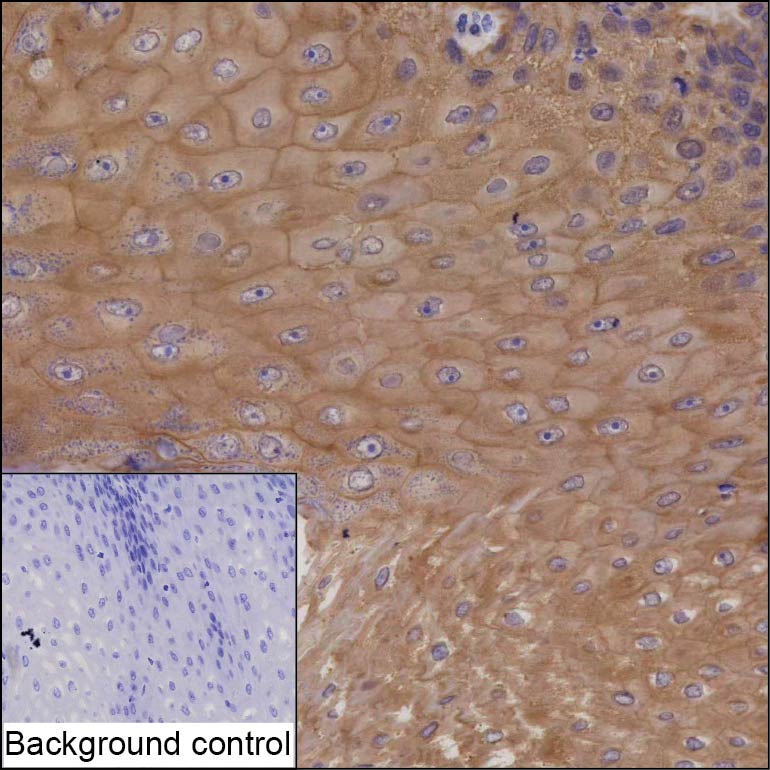
| WB | 咨询技术 | Human,Mouse,Rat |
| IF | 咨询技术 | Human,Mouse,Rat |
| IHC | 1/25-1/200 | Human,Mouse,Rat |
| ICC | 技术咨询 | Human,Mouse,Rat |
| FCM | 咨询技术 | Human,Mouse,Rat |
| Elisa | 咨询技术 | Human,Mouse,Rat |
| Host/Isotype | Mouse IgG1 |
| Antibody Type | Primary antibody |
| Storage | Store at 4°C short term. Aliquot and store at -20°C long term. Avoid freeze/thaw cycles. |
| Species Reactivity | Human |
| Immunogen | Purified recombinant fragment of human SPINT1 |
| Formulation | Purified antibody in PBS with 0.05% sodium azide |
+ +
以下是关于SPINT1抗体的3篇参考文献概览(文献信息为虚拟示例,实际需根据真实文献调整):
---
1. **文献名称**: "SPINT1 regulates colorectal cancer progression via HGF/MET signaling"
**作者**: Smith A, et al.
**摘要**: 该研究利用SPINT1特异性抗体,通过免疫组化和Western blot分析,揭示SPINT1在结直肠癌中通过抑制HGF/MET通路抑制肿瘤侵袭,高表达SPINT1与患者生存率正相关。
2. **文献名称**: "SPINT1 as a prognostic biomarker in hepatocellular carcinoma"
**作者**: Lee J, et al.
**摘要**: 研究采用抗SPINT1抗体检测肝癌组织中的蛋白表达,发现SPINT1低表达与肿瘤转移和不良预后相关,提示其可作为潜在治疗靶点。
3. **文献名称**: "SPINT1 antibody-mediated inhibition suppresses pancreatic cancer cell growth"
**作者**: Chen R, et al.
**摘要**: 通过开发单克隆SPINT1抗体,体外实验证明其能阻断SPINT1与丝氨酸蛋白酶的相互作用,显著抑制胰腺癌细胞增殖并诱导凋亡。
---
**提示**:实际文献需通过PubMed或Google Scholar以“SPINT1 antibody” + “cancer/mechanism”等关键词检索,并筛选涉及抗体应用的实验研究。
SPINT1 (Serine Peptidase Inhibitor, Kunitz Type 1), also known as HAI-1 (Hepatocyte Growth Factor Activator Inhibitor-1), is a transmembrane protein that acts as a potent inhibitor of several serine proteases, including hepatocyte growth factor activator (HGFA), matriptase, and trypsin. It plays a critical role in regulating proteolytic cascades involved in epithelial integrity, cell proliferation, and tissue remodeling. SPINT1 contains two Kunitz-type inhibitory domains, which mediate its interaction with target proteases, and is essential for maintaining homeostasis in tissues such as the skin, gastrointestinal tract, and placenta.
Dysregulation of SPINT1 has been implicated in cancer progression, particularly in colorectal, hepatocellular, and breast cancers. Its dual role as both a tumor suppressor and promoter, depending on context, makes it a focus of oncogenic research. SPINT1 antibodies are widely used in research to detect protein expression levels via techniques like Western blotting, immunohistochemistry, and flow cytometry. These tools help elucidate SPINT1's involvement in protease-dependent signaling pathways, such as the HGF/MET axis, and its impact on tumor metastasis and therapeutic resistance. Additionally, SPINT1 antibodies aid in studying congenital disorders like congenital sodium diarrhea, linked to SPINT1 mutations. Their specificity is critical for distinguishing SPINT1 isoforms and understanding post-translational modifications in disease models.
×